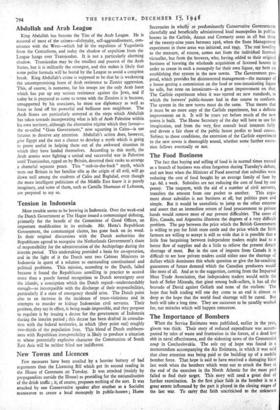The Food Business
The fact that buying and selling of food is in normal times treated as a branch of business was often forgotten during Tuesday's debate, and not least when the Minister of Food asserted that subsidies were reducing the cost of food bought by an average family of four by 14s. 6d. a week. Subsidies are not reducing the cost of food by one penny. The taxpayer, with the aid of a number of civil servants, transfers the amount from one pocket to another. This argu- ment about subsidies is not business at all, but politics pure and simple. But it would be unrealistic to jump to the other extreme and assert that an immediate return of food procurement to private hands would remove most of our present difficulties. The cases of Eire, Canada, and Argentina illustrate the degrees of a very difficult problem. The gap between the price which the British Government is willing to pay for Irish store cattle and the price which the Irish farmers are willing to accept is still so wide that it is possible that a little free bargaining between independent traders might lead to a better flow of supplies and do a little to relieve the present dreary shortage of meat. But in the case of imports from Canada it is difficult to see how private traders could either ease the shortage of i dollars which dominates this whole question or give the far-reaching guarantees of future demand which the Canadian producers would like most of all. And as to the suggestion, coming from the Imported Meat Trade Association, that independent traders would settle the hash of Senor Miranda, that giant among bulk-sellers, it has all the bravado of David against Goliath and none of the realism: The hope that bulk trading will one day come to an end is almost as deep as the hope that the world food shortage will be cured. But both will take a long time. They are successes to be §.t..eadily worked for, not miracles which will happen tomorrow.


































 Previous page
Previous page